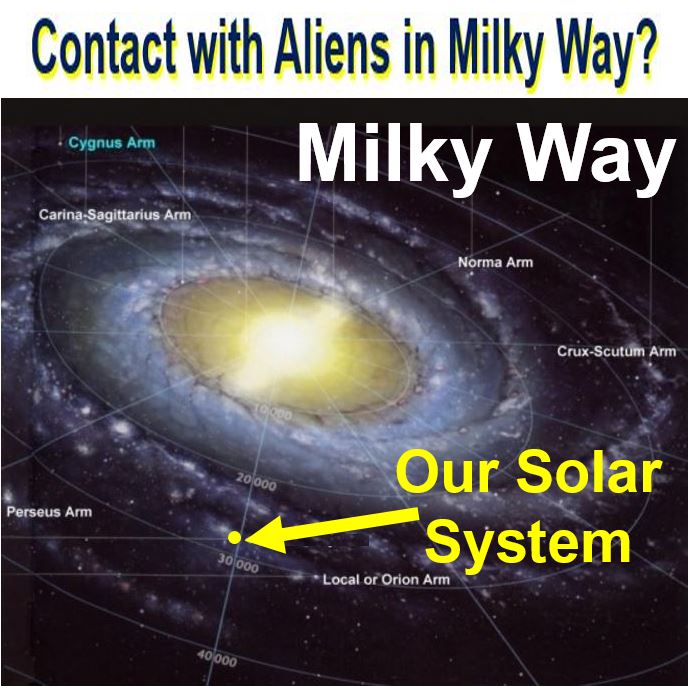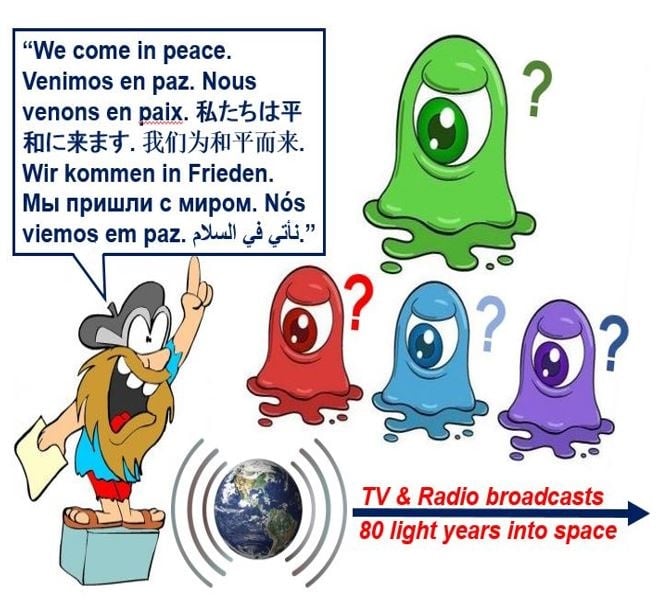The good news is that contact with aliens will happen, the bad news, however, is that it will not happen until about 1500 years’ time, say two scientists from the Department of Astronomy, Cornell University, Ithaca, New York. Space is a huge place, and in the world of astronomy 1,500 years is a very short time, they said.
Evan Solomonides and Yervant Terzian deconstructed the Fermi Paradox and paired it with the Mediocrity Principle and created a fresh equation – it predicts that extraterrestrials will not be phoning home or us for about fifteen-hundred years.
During a presentation at the American Astronomical Society’s meeting earlier this week in San Diego, Cornell student Evan Solomonides said:
“We haven’t heard from aliens yet, as space is a big place – but that doesn’t mean no one is out there.”
“It’s possible to hear any time at all, but it becomes likely we will have heard around 1,500 years from now. Until then, it is possible that we appear to be alone – even if we are not. But if we stop listening or looking, we may miss the signals. So we should keep looking.”
 Our Sun is one of the 200 billion stars in the Milky Way. So far, our TV and radio broadcasts have only covered 1% of our galaxy. In 1,500 years’ time they will have covered half of our galaxy. By then, we should have made contact with an advanced extraterrestrial civilization, scientists say. The yellow dot showing our Solar System is not to scale – in reality it would be barely visible. (Image: adapted from universetoday.com)
Our Sun is one of the 200 billion stars in the Milky Way. So far, our TV and radio broadcasts have only covered 1% of our galaxy. In 1,500 years’ time they will have covered half of our galaxy. By then, we should have made contact with an advanced extraterrestrial civilization, scientists say. The yellow dot showing our Solar System is not to scale – in reality it would be barely visible. (Image: adapted from universetoday.com)
The study has been posted in ArXiv, a repository of electronic pre-prints, known as e-prints, i.e. papers before they are published in academic journals or presented at a major meeting (citation below).
Fermi paradox and Mediocrity Principle
The Fermi paradox or Fermi’s paradox, named after the Italian physicist Enrico Fermi (1901-1954), known as the ‘architect of the atomic bomb’ and ‘architect of the nuclear age’, says there are billions of Earth-like planets in the Milky Way (our galaxy), however, no aliens have contacted us. Thus the paradox: the cosmos is teeming with possibility.
The Mediocrity Principle – which was originated by the Prussian Renaissance mathematician and astronomer Nicolaus Copernicus (1473-1543) – says Earth’s physical attributes exist elsewhere, they are not unique, as natural processes are likely common across the whole Universe, and therefore aliens will not find us for a while.
TV and radio broadcasts in space
Part of alien hunting involves sending out signals like TV and radio broadcasts. As our planet’s electric ambassador, radio and TV signals are emitted into space as a byproduct of broadcasting.
 Would an alien civilization even notice our radio signals? If they did, would they be able to decipher our messages? Even then, they would have to work out what we were saying in our 3,000+ languages.
Would an alien civilization even notice our radio signals? If they did, would they be able to decipher our messages? Even then, they would have to work out what we were saying in our 3,000+ languages.
These signals have been travelling at the speed of light for nearly a century. The scientists believe that these transmissions would be indecipherable for aliens, if they ever receive them. They would need to decode light waves into sounds, then parse over three thousand human languages to understand the message.
Look at it the other way round. Imagine we received a signal from an alien world sent 100 years ago containing three thousand languages we had absolutely no idea about, in a format that was unfamiliar to us. Would we even notice it?
Our broadcast signals have reached every single star and stellar system (solar system) up to nearly a century’s worth of light years from the Sun – which adds up to about 8,531 stars and 3,555 Earth-like planets. Our Milky Way is a very big place; it has more than 200 billion stars.
Mr. Solomonides said:
“Even our mundane, typical spiral galaxy – not exceptionally large compared to other galaxies – is vast beyond imagination.”
“Those numbers are what make the Fermi Paradox so counterintuitive. We have reached so many stars and planets, surely we should have reached somebody by now, and in turn been reached … this demonstrates why we appear to be alone.”
After combining the equations for the mediocrity principle and the Fermi paradox, Mr. Solomonides and Prof. Terzian suggest that we may have contact with aliens when about half of our galaxy has been signalled, i.e. in about 1,500 years.
Course assignment inspired this study
Mr. Solomonides added:
“This is not to say that we must be reached by then or else we are, in fact, alone. We simply claim that it is somewhat unlikely that we will not hear anything before that time.”
Mr. Solomonides said this study was inspired by an assignment in his astronomy course – The Search for Life in the Universe – which was taught by Terzian, Tisch, Distinguished University Professor and Director of NASA NY Spacegrant.
Mr. Solomonides is an aficionado of American astronomer, cosmologist, astrophysicist, astrobiologist, author, science popularizer, and science communicator in astronomy Carl Sagan (1934-1996), who used to be a Cornell Professor and contemplated this very problem – the likelihood of contact with aliens.
Mr. Solomonides said:
“We are on the third planet around a tediously boring star surrounded by other completely normal stars about two-thirds of the way along one of several arms of a remarkably average spiral galaxy. The mediocrity principle is the idea that because we are not in any special location in the universe, we should not be anything special in the universe.”
In an ArXiv Abtract, the authors wrote:
“We predict that under 1 percent of the galaxy has been reached at all thus far, and we do not anticipate to be reached until approximately half of the stars/planets have been reached.”
“We offer a prediction that we should not expect this until at least 1,500 years in the future. Thus the Fermi paradox is not a shocking observation, and humanity may very well be contacted within our species’ lifespan.”
Citation: “A Probabilistic Analysis of the Fermi Paradox,” Evan Solomonides and Yervant Terzian. Abstract accepted by the AAS for 16 June 2016 presentation in San Diego. Press conference given regarding conclusions. arXiv:1604.07687 [physics.pop-ph].
Video – Contact with aliens 1,500 years away
If extraterrestrials do exist, it could take at least 1,500 years before they make contact with us, say to Cornell astronomers.

Comments are closed.